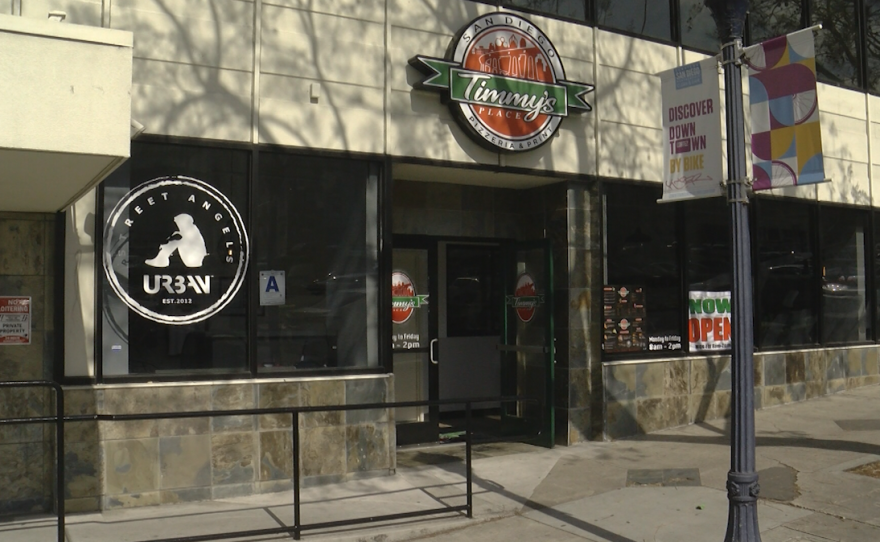Peter Seidler is baseball royalty. The billionaire professional sports franchise owner has taken San Diego by storm since he bought the Padres in 2012. But what many people don’t know about Seidler is his infectious optimism for creating a better future for San Diego’s homeless population.
“Sadness is endless,” he said. ”Every new homeless face that you see, and more often than not, they'll share their story with you, you can see something really good inside that person that's suffering right now and you want to help them.”
It’s a personal mission, but one where he can use the profile of the Padres to create a bigger impact for San Diego.
“The ballpark is a place for joy,” he said. ”People come out here and they want to forget their worries. And for a long time, I thought, this is my personal endeavor. And so there was a degree of separation. But I think now that the homeless population has grown and currently is growing with real visibility, to bring it back on the decline, we've decided to really put our foot to the accelerator and see what the Padres can do to help.”
But efforts to address homelessness around Petco Park have not come without controversy. In 2016, sharp rocks were installed to deter homeless encampments. City emails reported by Voice of San Diego showed the rock project was in connection to the upcoming All-Star Game. This March, ahead of Padres opening day, city crews swept homeless encampments away from the ballpark.
Seidler is a member of the board of directors for Lucky Duck Foundation, which funds and implements programs to alleviate homelessness.
Youth homelessness is one of their main priorities for 2023. One of the newest programs to launch is a pizza and print shop on 5th Avenue in downtown San Diego called Timmy’s Place. The Lucky Duck Foundation worked with Urban Street Angels to add 20 additional beds to the adjoining youth shelter where transitional youth can stay until they find permanent housing. Some of the youth will also work at Timmy’s, learning valuable career skills.
“A big chunk of the homeless population, they need jobs, and some need job training as well as other things,“ Seidler said. “And this is not just job training where you learn how to put some tomato sauce and cheese and pepperoni and say, ‘I know how to make a pizza.’ There's a path to learn marketing and accounting and all the things an entrepreneur needs or somebody that's going to be really valuable to a bigger organization. And so that's one of the many shining lights.”

Timmy’s Place employee Wren Williams experienced homelessness for more than a year. Suffering from mental illness, he didn’t think he would ever become an adult.
“I grew up in some environments that were really toxic to me, especially as a transgender person,” he said.
Publicly and privately funded programs like Urban Street Angels and Timmy’s gave him what he was quickly running out of, hope and trust, he said.
“It meant my whole world to me,“ he said. “It's hard to know what words to use, to say that your life was changed.”
Drew Moser, the executive director of Lucky Duck Foundation, has helped steer more than $2.5 million into 21 different job training programs for the homeless.
“Our group has said from day one, we can't operate at the speed of government, and so we're very much focused on operating daily with a sense of urgency,” he said.
Half of the chronically homeless population lost their homes as youth, Moser said.
“If we can catch those kids while the cement is still wet, you can completely change their lives,” he said. ”And not just change their lives, save their lives. We're laser-focused on helping kids find those bright and immediate pathways off the streets.”
Lucky Duck Foundation is now raising money to make the program self-sustaining over time as a business model while the young employees will learn core business principles to use in the future. Moser said Lucky Duck provides hope that homelessness can be in the rear view mirror.
Timmy's Place employee Williams said he wishes people would assume that homelessness is more complicated than it looks and shares a message for San Diegans.
“We need you now. We need you now,” he said. “I would encourage San Diego to just keep donating, keep showing up to places like Timmy's and keep being a kind face. Smiling at a homeless person is in and of itself a lot.”
Seidler said in this work he sees something he calls “the San Diego spirit,“ which means people collaborate and compromise.
“People generally want to do their fair share, and I think we're at a point now where I think this year we're going to slow the momentum and start to see the numbers going back down,” he said. “This is a city that has a heart more than most, and I think a lot of people in this city will want to do something that's helpful. But it's a scary issue, and I think fear drives a lot of things. But I do believe we're headed in the right direction.
It's important for Seidler that people know he is committed to the issue for life. Much like the growing dreams for the Padres, he is stacking the deck to change experiences of homelessness to experiences of hope.
“There's a lot of great things we can do on this planet, and I intend to be here for a long, long time,” he said.
-
The bus driver strike in San Diego is raising questions about the privatization of public transit.
-
One-on-one therapy isn't meeting the mental health needs of the Asian American community.








